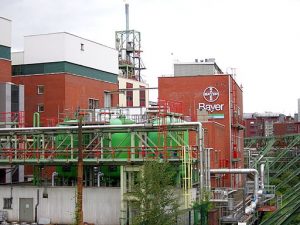Bayer is abandoning a facility in Germany in plans to concentrate all hemophilia factor VIII protein production at its plant in Berkeley, California. The decision comes as part of a full business restructure, which will axe 12,000 jobs.
In 2014, Bayer invested more than €500 million ($568 million) into its recombinant factor VIII (rFVIII) hemophilia manufacturing network, including establishing additional capacity at a plant in Wuppertal, Germany.
But as part of a significant business shake-up announced yesterday, the German drugmaker announced it will not utilize the facility, instead focusing all its factor VIII production at its Berkeley, California site.

The Wuppertal plant will not be utilized and 350 jobs are set to be lost. Image: WikiMedia/Frank Vincentz [GFDL
Around 350 jobs will be lost at the site, and Ackermann added “impairments and write-offs at pharmaceuticals of around 0.6 billion euros [$680 million]” related to the decision in Wuppertal.
The planned plant exit is the latest in Bayer’s factor VIII restructure. In October, the firm announced cuts to the Berkeley site itself, axing 227 jobs, 17% of the workforce.
Bayer committed $100 million to Berkeley in 2015, to build a product testing facility for the next generation of treatments for patients with hemophilia A. The site is responsible for producing all three of Bayer’s rFVIII therapies, including Jivi, a pegylated, long‐acting plasma/albumin free, full‐length rFVIII, recently approved in the US and Japan.
Bayer restructure
The news forms part of a major business and R&D restructure being undertaken at Bayer following its $63 billion merger with Monsanto, completed earlier this year.
This includes exiting from its Animal Health business and various consumer health brands, and globally will involve a total job reduction of 12,000.
“We have made very good progress with Bayer’s strategic development in recent years. As we now proceed with these measures, we are laying the foundation to sustainably enhance Bayer’s performance and profitability,” said Bayer chairman Werner Baumann. “With these measures, we are positioning Bayer optimally for the future as a life science company.”
